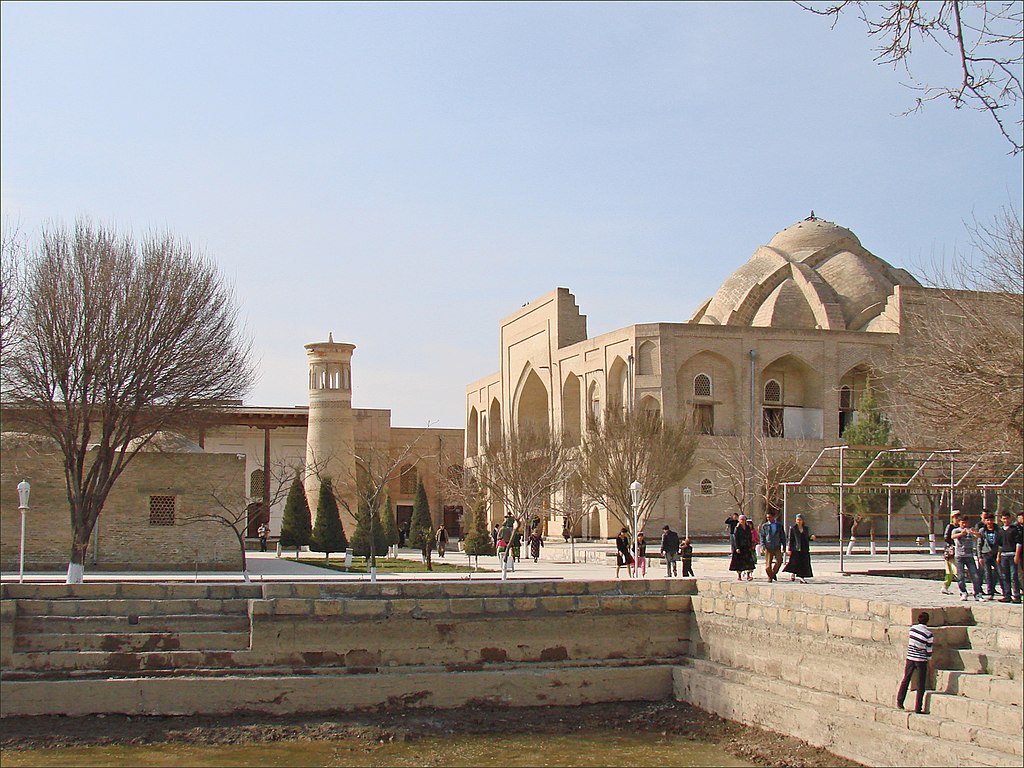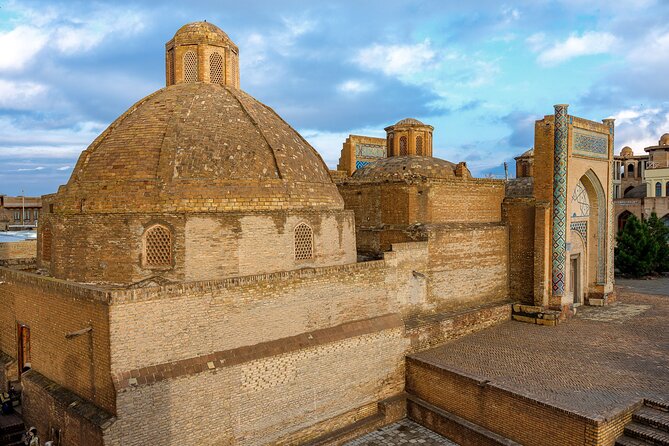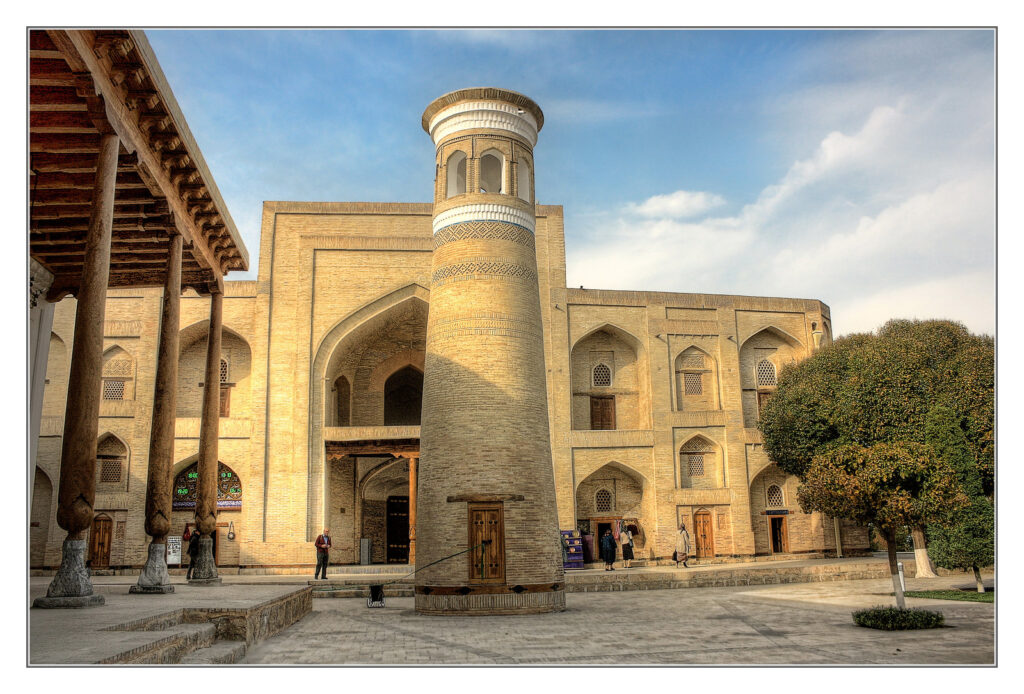Bukhara, an ancient city in Uzbekistan, has hundreds of historical landmarks and monuments and welcomes thousands of tourists every year.
While most tourists don’t venture beyond the well-trodden monuments of the old city, Bukhara is also renowned in the Islamic world as a pilgrimage site.
The city holds particular significance for its ‘seven saints’ or pirs— Sufi theologians, thinkers, and scientists who lived during the Middle Ages from the 9th to the 14th century.
Disclaimer: This blog post may contain affiliate links. If you make a purchase through these links, I may earn a commission at no extra cost to you. Your support is greatly appreciated and helps me continue to provide valuable content. Thank you!
Seven Saints of Bukhara
Bukhara is where seven important Nakshbandi Sufi leaders were born. They lived here, making Bukhara a special place for spirituality. Their tombs, considered holy in the Muslim faith, are found here, adding to the city’s importance.
What is Sufism?
Sufism is a branch of Islamic mysticism that delves into the spiritual quest for the divine, distancing itself from materialistic pursuits. With particular emphasis on discipline, it revolves around profound love and devotion to God.
Sufism encompasses diverse schools of thought centered on spiritual experiences and connection with the divine. Sufism is found globally, including in Bukhara which was a religious center for the practice.

Who Were the Seven Saints of Bukhara?
- Khoja Abdulkhalik Ghijduwani
- Khoja Muhammad Orif Revgari
- Khoja Mahmud Anjir Faghnewi
- Khoja Ali Ramitani
- Khoja Muhammad Bobo Samosi
- Khoja Sayyid Amir Kulal
- Khoja Bahauddin Nakshbandi
Khoja Abdulkhalik Ghijduwani (1103-1179) was a towering figure, founder of the Khojagon Sufi school in Mawerannahr. With striking features—tall and with a broad physique—he emphasized hidden dhikr for spiritual growth, departing from his teacher’s methods.
Renowned across the Islamic world, his mystical teachings drew crowds, yet his death date remains uncertain, likely around 1179. His burial site near Gijduvan honors his profound legacy and is the starting point of most tours.
Khoja Orif Revgari (1165-1259), successor to Abdulkhalik Gijduvani, was esteemed for knowledge and piety. Known as “Mohitobon” for his moon-like face, he authored “Arifnama” and guided followers for over a century. His mausoleum in Shafirkan, Bukhara, is a revered pilgrimage site, housing a mosque built in 1997.
Khoja Mahmud Anjir Faghnewi (12th century–1286), a disciple of Khoja Arif Revgari, significantly contributed to Bukhara’s architecture. His resting place, Andjirbog, transformed into a vibrant memorial post-independence, boasting a two-story mausoleum, a grand mosque, lush gardens, and modern amenities, attracting pilgrims and visitors.
Khoja Ali Ramitani (13th century–1310/1321), known as Khojai Azizan, hailed from Kurgan village in Bukhara. A weaver by trade, he embraced asceticism and spiritual teachings. He succeeded Mahmud Faghnewi, gaining numerous followers. His teachings are preserved in the renowned “Risolai Azizon.”
He rests in Old Urgench (Turkmenistan), although a symbolic mausoleum stands in Ramitan, Bukhara. This site boasts a restored complex with a mosque, well, and lush gardens, offering visitors a serene and sacred experience.
Khoja Muhammad Bobo Samosi (1259-1354) upheld the spiritual lineage under Ali Ramitani. A beacon of hidden knowledge, he led the gold chain of succession. His life centered on spiritual growth, nurturing a revered vineyard, and post-independence, his tomb became a pilgrimage site after restoration in Uzbekistan.
Khoja Sayyid Amir Kulal (1281-1370), born near Bukhara, was apparently introduced to spirituality by Khoja Muhammad Bobo Samasi on a wrestling field. His mausoleum, refurbished in Bukhara’s style, houses his grave in the Yangi Hayot farm complex. The mosque, built post-independence, hosts 300 worshippers.
Khoja Muhammad Bahauddin Bukhari Nakshbandi (1318-1389) founded the Nakshbandi Sufi order, emphasizing quiet meditation and rejecting ostentation. He formulated 11 meditation rules and promoted simplicity.
His shrine complex in Bukhara underwent significant renovation after Uzbekistan gained independence. The ensemble includes mosques, minarets, and the sacred burial place of his mother.
RELATED POST: Where to Stay in Bukhara
Bukhara Seven Saints Tour

The burial sites of the seven saints of Bukhara can be visited in one day but require transport to do so as they are scattered around the Bukhara region.
A tour to the tombs includes private transportation plus a licensed knowledgeable guide to talk you through the sites. Entry to all monuments is included.
Whilst the tour is certainly not cheap it’s one of the most off the beaten path trips you can take in Bukhara. Very few make it to all of these spiritual sites and the tour guides have knowledge you won’t find online.
Read more about the Seven Saints of Bukhara tour here…
Tour Info
Included:
- Pickup from hotel
- Licensed Guide
- Private transportation
- Entrance Tickets to All Monuments
Not included:
- Tips
- Additional fees to take professional photos/videos
- Lunch
Reviews
“Shakhnoza was a terrific guide. She gave me information about each saint and answered all my questions. She helped me purchase items at the gift shops, told me about local customs, and was generally helpful in all aspects of the tour. I highly recommend her.”
“The description says 7-8 hours. We took a solid 7 hours, but didn’t stop for lunch. If I had asked I’m sure they would have accommodated my need for food. If you’re the kind of person who can sense the spiritual energy at sites like these, you will find that these Sufis were/are amazing beings.” More reviews…
The Seven Saints of Bukhara tour isn’t your usual sightseeing experience—it’s not everyone’s cup of tea. But if you’re seeking a spiritual journey or love off-the-beaten-path adventures, this trip could be just what you’re looking for!
Related Articles:
PS. If you’re looking for a standard DIY Bukhara travel itinerary click here.
